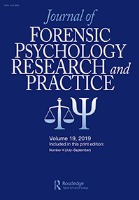
Journal of Forensic Psychology Research and Practice
Scope & Guideline
Connecting Empirical Research with Practical Solutions.
Introduction
Aims and Scopes
- Forensic Assessment and Evaluation:
The journal emphasizes rigorous methodologies in forensic assessments, including psychometric evaluations and the application of various psychological tests to inform legal decisions. - Interventions in Forensic Settings:
Research on therapeutic interventions and programs designed for individuals in forensic contexts, including treatment efficacy and innovative approaches to rehabilitation. - Qualitative Research on Offender Experiences:
Exploration of qualitative methodologies to understand the lived experiences of offenders, victims, and professionals in the forensic field. - Psychology of Crime and Violence:
Investigation into psychological factors contributing to criminal behavior, including studies on aggression, personality disorders, and the impact of childhood experiences on later offending. - Professional Practices in Forensic Psychology:
Insights into the practices of forensic psychologists, including supervision, training, and ethical considerations in assessments and interventions.
Trending and Emerging
- Trauma-Informed Care and Practices:
An increasing emphasis on trauma-informed approaches in forensic settings, recognizing the impact of adverse childhood experiences on offending behavior and the need for supportive interventions. - Intersectionality in Forensic Psychology:
Emerging research that examines how various social identities (e.g., race, gender, socioeconomic status) intersect to affect individuals' experiences within the forensic system. - Innovations in Forensic Technology:
Research exploring the use of technology in forensic assessments and interventions, including the application of artificial intelligence and mobile applications in evaluating mental health. - Community-Based Interventions:
A growing focus on community-based programs and alternatives to incarceration, highlighting the importance of rehabilitation in non-institutional settings. - Psychological Impact of COVID-19:
Investigations into the effects of the COVID-19 pandemic on forensic populations, including mental health challenges and adaptations in service delivery.
Declining or Waning
- Traditional Approaches to Criminal Responsibility:
The focus on conventional methods of assessing criminal responsibility has waned, possibly due to the shift towards more nuanced understandings of mental health and criminal behavior. - Generalized Studies on Substance Abuse:
Research that broadly addresses substance abuse without specific forensic implications has seen a decline, as the journal increasingly prioritizes studies linking substance use to forensic outcomes. - Static Risk Assessment Models:
There appears to be a reduced emphasis on static risk assessment models, as the field moves towards more dynamic approaches that consider the changing nature of risk factors. - Single-Domain Studies:
There is a noticeable decrease in studies that focus solely on one aspect of forensic psychology, with a growing trend towards interdisciplinary and multifaceted research.
Similar Journals
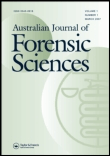
Australian Journal of Forensic Sciences
Advancing Forensic Knowledge for Tomorrow's InvestigatorsThe Australian Journal of Forensic Sciences, published by Taylor & Francis Ltd, stands as a pivotal resource in the field of forensic medicine and pathology. With an ISSN of 0045-0618 and an E-ISSN of 1834-562X, this esteemed journal has been at the forefront of forensic research since its inception in 1968. Currently classified in the Q2 category for the year 2023 within its domain, it ranks 92nd out of 208 journals, placing it within the 55th percentile in Scopus rankings. The journal's scope encompasses a diverse range of topics critical to the advancement of forensic sciences, making it an essential platform for researchers, professionals, and students seeking to stay abreast of the latest developments and methodologies in the field. Although not an open-access publication, the journal serves as a crucial conduit for disseminating high-quality research, contributing significantly to the ongoing evolution of forensic practice and knowledge.
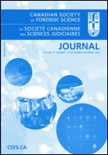
Canadian Society of Forensic Science Journal
Pioneering Insights in Forensic Pathology and MedicineThe Canadian Society of Forensic Science Journal, published by Routledge Journals, Taylor & Francis Ltd, serves as a vital platform for the dissemination of research in the field of forensic science, particularly focusing on pathology and forensic medicine. With a rich history since 1968 and an impressive commitment to academic rigor, this journal has established itself as an essential resource for researchers, practitioners, and students alike. Recognized within the Q3 category in the 2023 Scimago Journal Rank in Pathology and Forensic Medicine, it ranks #162 out of 208 journals in its category, affirming its relevance and contribution to the field. While it does not operate under an open access model, the journal remains accessible through institutions and libraries and provides critical insights into advancements and best practices in forensic science. Through its comprehensive approach, the journal aims to advance forensic knowledge and contribute to the professional development of those engaged in this pivotal area of study.
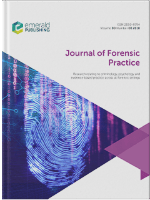
Journal of Forensic Practice
Bridging Law and Science for a Safer TomorrowThe Journal of Forensic Practice, published by Emerald Group Publishing Ltd, is a leading scholarly resource dedicated to the interdisciplinary domain of forensic science, law, and psychology. With an ISSN of 2050-8794 and an E-ISSN of 2050-8808, this journal serves as an essential platform for disseminating cutting-edge research and innovative practices in the field, spanning from 2013 to 2024. Despite its current impact factor positioning, ranking in quartiles such as Q4 in Applied Psychology and Q2 in Law illustrates its relevance to diverse academic communities, particularly within the United Kingdom and beyond. Researchers, practitioners, and students benefit from the journal's commitment to enhancing the understanding of the intersection between legal frameworks and psychological principles, thereby fostering a more robust forensic practice. The journal is not currently an open-access publication, ensuring a focused and specialized audience while gradually building its reputation across various Scopus categories. As the field of forensic practice evolves, this journal remains a vital source of knowledge, offering insight and guidance to the contemporary challenges faced by professionals in law and forensic sciences.

Revija za Kriminalistiko in Kriminologijo
Driving Change Through Rigorous Research in JusticeRevija za Kriminalistiko in Kriminologijo is a prominent academic journal dedicated to the fields of criminalistics, criminology, law, and forensic medicine, published by the Ministry of Interior Republic Slovenia. With its inception in 1981, the journal has served as a pivotal platform for disseminating research findings and innovative ideas relevant to crime and justice issues, particularly in the context of Slovenia and the wider region. Despite its current Q4 ranking in various categories, including Law and Pathology & Forensic Medicine, Revija za Kriminalistiko in Kriminologijo remains essential for emerging scholars and professionals seeking to contribute to the discourse in forensic science and social psychology. Although the journal does not offer open access options, it continues to publish rigorous peer-reviewed articles that significantly impact the field, making it a valuable resource for researchers, practitioners, and students alike. Scholars can access the research at the journal's address in Ljubljana, Slovenia, thereby fostering interdisciplinary collaboration and knowledge sharing.

PSYCHOLOGY CRIME & LAW
Unraveling the Complexities of Human Behavior in Legal ContextsPSYCHOLOGY CRIME & LAW, published by Routledge Journals, Taylor & Francis Ltd, is a premier academic journal dedicated to the intersection of psychology, criminology, and the law. With an ISSN of 1068-316X and an E-ISSN of 1477-2744, this journal provides a critical platform for the dissemination of cutting-edge research and innovative methodologies in the fields of psychology, forensic medicine, and legal studies. Spanning over three decades (1994 to 2024), it holds impressive Scopus rankings, placing it in Q1 and Q2 quartiles for its contributions to law and forensic medicine, highlighting its standing within the academic community. PSYCHOLOGY CRIME & LAW is particularly noted for addressing contemporary issues at the crossroads of human behavior and legal standards, making it essential reading for scholars, practitioners, and students alike. While the journal is not open access, it offers valuable insights into a variety of topics, from criminal psychology to the implications of mental health in legal contexts, ensuring that it remains an influential resource for those engaged in research and professional practice.

Recht & Psychiatrie
Uniting Legal Insight with Psychiatric Expertise.Recht & Psychiatrie, published by PSYCHIATRIE VERLAG GMBH, is a prominent journal that bridges the critical fields of law and psychiatry. With an ISSN of 0724-2247, this journal has been a vital resource for legal and mental health professionals since its inception in 1999, although its coverage in Scopus was discontinued in 2019. The journal has consistently ranked within the 71st percentile in Social Sciences law and offers valuable insights into the intersection of legal frameworks and psychiatric practice. While it currently does not provide open access options, researchers and professionals can benefit from its rigorous, peer-reviewed articles that address contemporary issues at the nexus of law and mental health. Based in Köln, Germany, Recht & Psychiatrie continues to contribute significantly to the discourse surrounding health policy and mental health jurisprudence, making it an essential resource for anyone engaged in the study or practice of these interconnected domains.
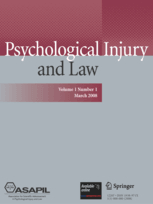
Psychological Injury & Law
Transforming Legal Perspectives on Psychological HealthPsychological Injury & Law, published by SPRINGER, stands at the forefront of interdisciplinary research, merging insights from the fields of law, psychology, and mental health. With an ISSN of 1938-971X and an E-ISSN of 1938-9728, this esteemed journal aims to address the complexities of psychological injuries within legal contexts, providing a platform for scholars to explore the intersection of legal principles and psychological well-being. Recognized for its rigor, it has achieved a Q1 ranking in both Ecology and Law, and a Q2 ranking in Psychiatry and Mental Health for 2023, demonstrating its influence and contribution to these fields. Additionally, with impressive Scopus ranks placing it in the 95th percentile within Social Sciences (Law) and the 70th percentile in Medicine (Psychiatry and Mental Health), the journal consistently showcases high-quality, impactful research that resonates with professionals, academics, and students alike. By fostering a deeper understanding of psychological injuries, it serves as an essential resource for those seeking to navigate the intricate relationships between mental wellness and legal frameworks.

Psychology and Law
Unlocking the psychological dimensions of legal challenges.Psychology and Law, published by Moscow State Psychological & Pedagogical University, is an open-access journal dedicated to advancing knowledge at the intersection of psychology and legal studies. Since its establishment in 2011, the journal has provided a platform for high-quality research that addresses critical issues in applied, clinical, experimental, cognitive, and social psychology. Despite ranking in the Q4 quartile for various psychology categories in 2023, this journal remains committed to fostering insightful discussions and contributions to the field. Researchers and practitioners from diverse backgrounds are encouraged to explore its accessible content, which aims to enhance our understanding of psychological principles within legal contexts. The journal's ISSN is 2222-5196, and it primarily serves an international audience, promoting scholarly engagement and interdisciplinary collaboration. As the field evolves, Psychology and Law continues to be a vital resource for those seeking to bridge the gap between psychological research and legal practice.

Egyptian Journal of Forensic Sciences
Innovating the intersection of law and forensic science.The Egyptian Journal of Forensic Sciences, published by the International Association of Law & Forensic Sciences, stands as a premier platform for scholarly communication in the fields of forensic science, law, and health-related social sciences. With an ISSN of 2090-536X and an E-ISSN of 2090-5939, this open-access journal, established in 2011, has garnered a reputation for its rigorous peer-review process and substantive contributions to the field. Housed in Switzerland, it boasts impressive metrics, achieving a Q2 ranking in Health (social science) and a stellar Q1 in Law, in addition to being recognized in Pathology and Forensic Medicine. With its articles accessible to a global audience, the journal encourages the exchange of innovative ideas and practices among researchers, professionals, and students who are dedicated to advancing the disciplines of forensic science and legal studies. As of 2023, it ranks in the 75th percentile in Social Sciences - Law and continues to influence both academic discourse and practical applications in the forensic domain.
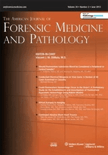
AMERICAN JOURNAL OF FORENSIC MEDICINE AND PATHOLOGY
Transforming Insights into Forensic SolutionsThe American Journal of Forensic Medicine and Pathology is a pivotal publication within the field of forensic science and pathology, dedicated to disseminating influential research and advancements in the evaluation of death and injury in legal contexts. Published by Lippincott Williams & Wilkins, this journal, which has been in circulation since 1980, serves as a vital resource for professionals, researchers, and students focused on intersecting disciplines such as medicine and forensic investigations. While it holds a respectable Q3 ranking in both the Medicine (Miscellaneous) and Pathology and Forensic Medicine categories as of 2023, the journal's impact is underscored by its contributions to the ongoing dialogue on forensic practices and methodologies. The American Journal of Forensic Medicine and Pathology provides a platform for innovative papers that shape the future of forensic science, also offering insights through case studies, reviews, and research articles that cater to its diverse readership. With an ISSN of 0195-7910 and E-ISSN 1533-404X, the journal continues to support the scholarly community in advancing knowledge within this critical field.